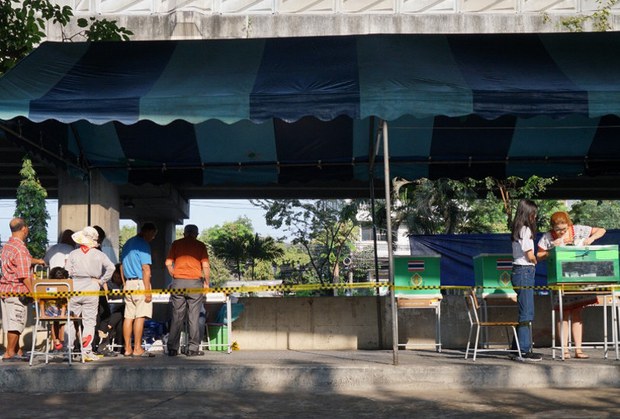Thailand Votes in First General Election Since 2014 Military Coup
2019.03.24
Bangkok
 A voter casts her ballot at the Phyathai polling station in Bangkok as voting opens in Thailand's general election, March 24, 2019.
A voter casts her ballot at the Phyathai polling station in Bangkok as voting opens in Thailand's general election, March 24, 2019.
Updated at 3:50 p.m. ET on 2019-03-24
Millions of Thais cast ballots Sunday in Thailand’s first general election since a military coup in 2014, as Prime Minister Prayuth Chan-o-cha sought to transform himself from junta chief to elected leader.
With 95 percent of votes tallied, Prayuth’s Palang Pracharat Party (PPP) had won fewer seats in the 500-member lower house of parliament than the Pheu Thai Party of exiled and deposed former Prime Minister Thaksin Shinawatra, according to Thai media reports.
Still, Prayuth, a retired army chief who began leading the country after heading the coup, could end up winning the country’s top political office.
Late Sunday, Election Commission (EC) Chairman Ittiporn Boonprakong announced partial results by province but declined to give a tally of parliamentary seats. Updated results would be announced Monday morning, he said.
“Anything else, you will hear from me and the secretary general tomorrow,” Ittiporn said.
The Election Commission said turnout was at 66 percent among the 51.2 million people who were eligible to vote to determine the 500 members of the House of Representatives, according to Reuters news service, which cited commission estimates based on 90 percent of ballots counted. That figure contrasted sharply with nearly 87 percent who turned out for early voting on March 17.
Close to 80 political parties competed for House seats.
Pheu Thai had won 129 seats outright, compared to PPP’s 98, according to the Bangkok Post, which estimated at 12:30 a.m. Monday (local time) that PPP would be awarded 19 “party-list seats” compared to zero for Pheu Thai.
Of 500 seats in the lower chamber, 350 will be directly elected, and another 150 party-list seats will be assigned based on overall results, under new procedures. In addition, the 2017 constitution allowed Prayuth’s junta-led government to hand-pick the entire 250-member senate who will vote with the 500-member lower house for prime minister.
Because he appointed the senators, Prayuth is expected to have overwhelming support from them, giving him a good start on the 376 votes – one more than one half of the House and Senate combined – needed to become the next prime minister.
![190322-TH-elections--prayuth-INSIDE.jpg Junta chief Prayuth Chan-o-cha casts his ballot at Phyathai polling station in Bangkok, in Thailand's first election since the 2014 coup, March 24, 2019. [Pimuk Rakkanam/BenarNews]](/english/news/thai/thailand-politics-03232019224812.html/190322-TH-elections-prayuth-INSIDE.jpg/@@images/5b4eb813-be6f-466c-ab8c-f8c9474e5042.jpeg)
Prayuth, the 65-year-old former army chief of staff, has rebranded himself as a “man of the people” with an Instagram account showing him cooking, hugging elderly women and riding a train with smiling children.
“The military has been doing everything in order to be able to extend its power. The way the constitution has been drafted … everything has been skewed toward helping the military maintain its grip on power,” Umesh Pandey, a former MP candidate with the now-banned Thai Raksa Chart party, told BenarNews hours before the polls opened.
Leader steps down
Another former prime minister, Abhisit Vejjajiva, appears to be the first political casualty of the election. The leader of the Democrat Party, Thailand’s oldest political party, announced his resignation following a poor turnout at the polls.
“The unofficial results did not meet my targets in terms of the number of seats or being No 1. I must apologize to all Democrat supporters for being unable to push our ideology forward,” Abhisit said. “I must show responsibility. I'm resigning as party leader.”
Meanwhile, Sudarat Keyuraphan, the leader of Thaksin’s Pheu Thai party, took a firm stance after voting.
“We have longed for an election for so long, to exercise the right to vote for the country and for us all,” Sudarat told reporters after she cast her ballot. “I hope the election commission takes good care of the elections, counts the tally with transparency.”
She went on to say the party receiving the most votes should have the right to form the government, the Associated Press reported.
King’s message
Leading up to Sunday’s vote, King Maha Vajiralongkorn issued a message citing a speech delivered by his late father in which the revered monarch said he worried about national security and advised listeners to “prevent bad people from grabbing power.”
“Maintaining national peace and order is therefore not about making everyone good; it’s about supporting good people so they can govern and prevent bad people from grabbing power and creating trouble and unrest,” the statement said, quoting a speech delivered to boy scouts 30 years ago.
Chumphon Phansuwan, 69, a retired civil servant, was among Bangkok residents who came out to vote early on a hot, sunny election day.
“I want democracy, of course, that is why I come out to vote. I want the government to solve problems. The economy is bad,” he told BenarNews.







